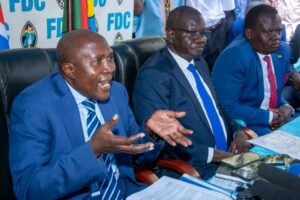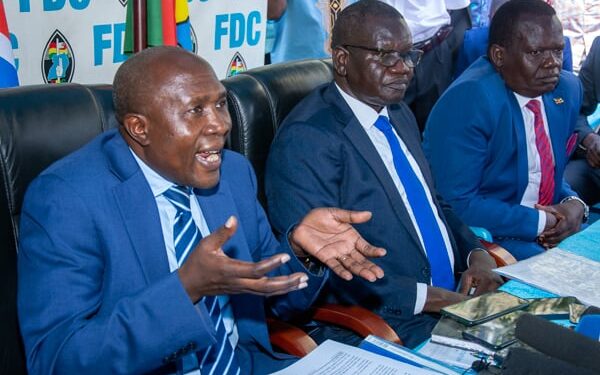
FDC Rejoins IPOD to Avert Financial Collapse Amid Leadership Blame Game
Kampala, Uganda – August 13, 2025 — The Forum for Democratic Change (FDC) has officially rejoined the Inter-Party Organisation for Dialogue (IPOD), marking a major shift in its political stance after years of withdrawal.
The move comes as the party struggles with severe financial difficulties following the passing of the Political Parties and Organisations (Amendment) Act, 2025. The new law restricts government funding to only those political parties that are members of IPOD and committed to democratic principles.
FDC President Patrick Amuriat and Secretary General Nandala Mafabi signed a new memorandum of understanding with IPOD on August 12, ending a seven-year boycott that began in 2018 over concerns about IPOD’s effectiveness.
At the signing, Mafabi squarely blamed former FDC president Dr. Kizza Besigye for leading the party into crisis by pushing for the 2018 withdrawal.
“All this is the fault of Kizza Besigye. He misled us into leaving IPOD because of his own ulterior motives. Now, the party is on the verge of collapse,” Mafabi said.
Besigye, long a vocal critic of IPOD, previously argued that the platform was a government tool to weaken opposition voices a position that once resonated within the FDC but has now left the party in dire straits.
Further adding to the turmoil, Amuriat blamed Kampala Lord Mayor Erias Lukwago for deepening divisions within the party, accusing him of undermining FDC unity and paving the way for the formation of the splinter group, the Peoples’ Front for Freedom (PFF).
“We recruited Lukwago, not knowing we were bringing a snake into our party,” Amuriat remarked.
Lukwago, formerly of the Democratic Party (DP), has been linked to growing factionalism in the FDC. The departure of PFF-aligned members has left the FDC cash-strapped and struggling to function.
Rejoining IPOD is seen as the FDC’s last lifeline, with state funding now essential to sustain operations such as mobilization, campaigns, and administrative work.
Political observers say the decision marks a strategic retreat — a recognition that, in Uganda’s evolving political landscape, opposition parties without state support face mounting challenges in staying afloat.

















